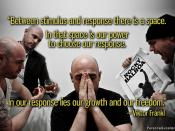Viktor E. Frankl's essay "Man's Search for Meaning" offers an inspiring look into the core of human existence. He uses his own personal experiences to draw conclusions about human nature. While a prisoner in Nazi concentration camps, Frankl witnessed the horrors of dehumanization daily. As a neurologist, he was able to use his psychology background to analyze his own personal experience and that of his fellow inmates. He watched as every freedom, valuable and personal identity was taken away, revealing the core of man. The external layers were removed and what was left behind was the definition of humanity. He found that human nature is relational. In Man's Search for Meaning, Frankl asserts that the basis of human nature is defined by relationships with other humans.
Man's primary motivational force is his search for meaning. Finding meaning in one's relationships with others is critical. Frankl states that the most painful part of being a prisoner of war was the injustice of it all.
The pain of physical beatings, starvation and the uncertainty of survival could not compare to the mental agony caused by the injustice of the torture. The prisoners did not do anything to deserve their brutal punishment. They were left asking why they must suffer and there were no answers to their questions. The guards abused the prisoners without warrant. This unreasonable relationship between prisoner and guard constituted far more anguish than the pain of physical beatings. Frankl searched for the meaning of his suffering. The only justification was the belief that he was worthy of the suffering. The meaning of suffering can only be found by transcending the moment to understand the fullest impact of the experience. The meaning of suffering can not be taken away from an individual. Only the individual can...


